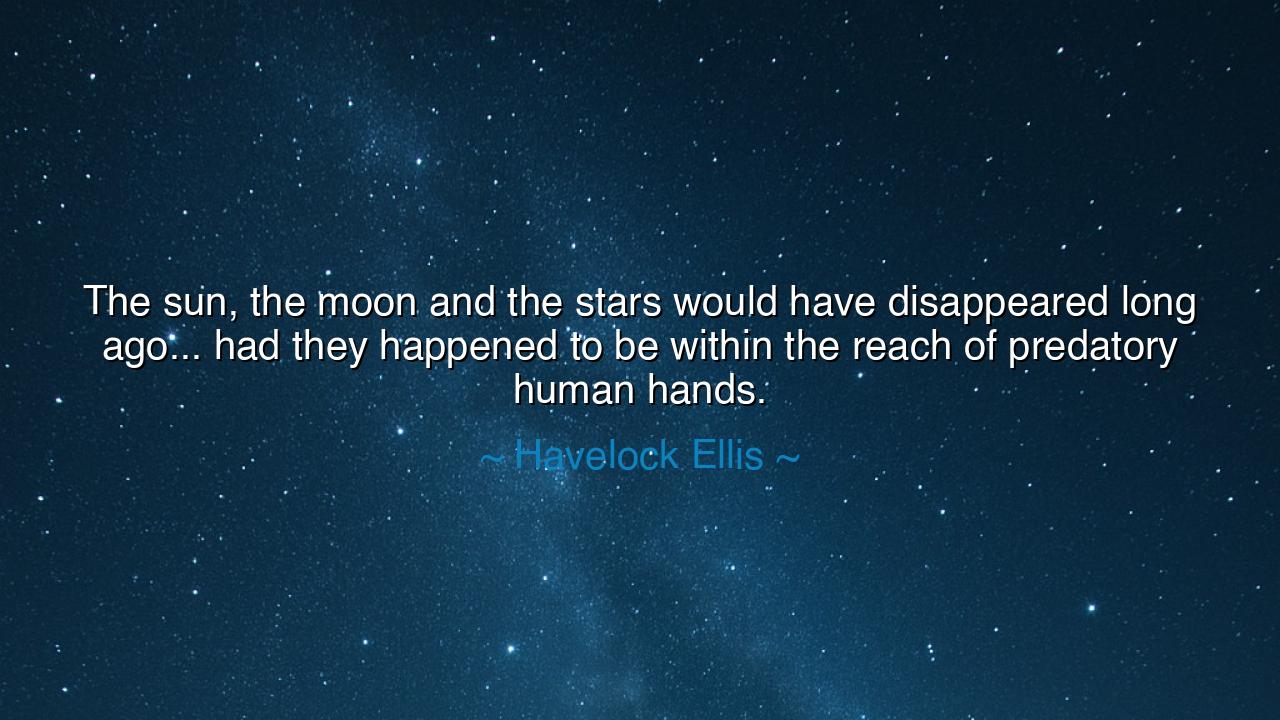
The sun, the moon and the stars would have disappeared long
The sun, the moon and the stars would have disappeared long ago... had they happened to be within the reach of predatory human hands.






Hear the warning of Havelock Ellis, philosopher and observer of humankind, who declared: “The sun, the moon and the stars would have disappeared long ago… had they happened to be within the reach of predatory human hands.” These words, heavy with irony, reveal a sorrowful truth: that man, driven by greed and short-sightedness, consumes what is beautiful and destroys what sustains him. Ellis saw with clarity that it is only the distance of the heavens, beyond our grasp, that has preserved their purity. Were they within reach, man’s hunger for possession might have plundered them into dust.
The meaning of this saying is sharp as a blade. Humanity, for all its brilliance, has often treated the treasures of the earth not as sacred gifts but as resources to be devoured. Forests fall, rivers are poisoned, mountains hollowed out—all for the insatiable desire of profit. What is near, man exploits; what is beyond reach, he romanticizes. Ellis’s lament is thus both accusation and prophecy: if the sun, the moon, and the stars had been within man’s power to mine, hoard, or sell, they might already have been reduced to ruin.
History bears witness to this. Consider the once-mighty Cedar forests of Lebanon, praised in the Scriptures as the glory of kings. They were cut down, one by one, to build temples, ships, and palaces. What was once a vast and sacred forest is now but fragments, a shadow of former majesty. Had mankind the same access to the heavens, the fate of the cedars would have been theirs also. The stars themselves might have been extinguished to fuel our endless appetites.
Or look to the fate of the American bison. Numbering in the tens of millions, they roamed the plains like living clouds of strength and freedom. Yet within a few decades, through reckless slaughter, they were driven nearly to extinction. This is Ellis’s truth made flesh: what man can touch, he often consumes without thought for the future. What is near to his hand, he rarely preserves; what is far, he praises as eternal.
Yet within Ellis’s irony lies also a call. For if we cannot reach the stars, we can still protect the treasures of the earth beneath our feet. The heavens remind us of what cannot be spoiled, but they also shine as mirrors, urging us to safeguard what remains within our grasp. The beauty of the world is not infinite; it depends upon restraint, reverence, and the choice to honor rather than exploit.
O children of tomorrow, take this lesson deeply: do not live as predators only. Learn to live as stewards. See in the sun not only warmth but the miracle of life; in the moon, not only light but the poetry of night; in the stars, not only wonder but the humility of knowing our smallness. Let these distant fires remind you to cherish what is still within your reach—forests, rivers, animals, even one another.
Therefore, let your practice be this: resist the hunger to consume without thought. Protect what you inherit, so that generations after you may still see beauty and breathe life. Plant where others cut, preserve where others destroy, cherish where others exploit. For if the heavens are beyond your hands, the earth is not. And what you do with it will decide whether your children live under skies of beauty or under ashes of regret.
Thus the words of Havelock Ellis endure as warning and wisdom: “The sun, the moon, and the stars would have disappeared long ago… had they happened to be within the reach of predatory human hands.” Let them remind you that greed without reverence destroys, but reverence without greed preserves. Choose the latter, and the heavens will shine not only above you, but within you.






AAdministratorAdministrator
Welcome, honored guests. Please leave a comment, we will respond soon